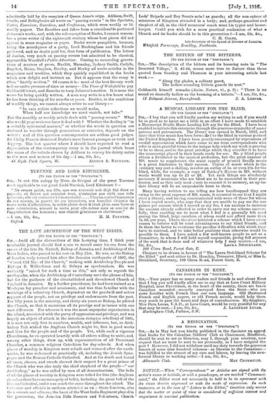THE LATE ARCHBISHOP OF THE WEST INDIES.
[TO TEE EDITOR OP THE SPECTATOR.") Sirt,—Amicl all the distractions of this hurrying time, I think your invaluable journal should find space to record some les.-,ons from the career of the late Dr. Nuttall, Bishop of Jamaica and Archbishop of the West Indies, who passed to his rest on May 21st. He was, as the Bishop of London truly termed him after the Jamaica earthquake of 1907, the "Grand Old Man of the Church," ranking with Archbishop Temple and Bishops S. Wilberforce and G. Selwyn as epochmakers. He was evidently "raised for such a time as this," not only as regards the earthquake, when the Archbishop of Canterbury used the phrase of him, but for the guidance of the disestablished and disendowed Church of England in Jamaica. By a further providence, he had been trained as a Wesleyan lay preacher and missionary, and was thus familiar with the workings of a voluntary Church, dependent on the goodwill and active support cf the people, not on privilege and endowments from the past. For fifty years in the ministry, and thirty-six years as Bishop, he piloted the Church, so that it maintains all its prestige and influence with one vast difference. For whereas it was the most unpopular organization in the island, associated with the party of oppression and privilege, and was largely an object of attack in the notorious rising (or rebellion) of 1866, it is now not only first in numbers, wealth, and influence, but, as Arch- bishop Tait wished the Anglican Church might be, first in good works and love for the people and of the people. Yet, while such a vigorous Churchman, he co-operated heartily with all others willing to unite, and, among other things, drew up, with representatives of all Protestant Churches, a common religious Catechism for day-schools. And when places of worship in Kingston were rebuilt and restored after the earth- queke, he was welcomed at practically all, including the Jewish Syna- gogue and the Roman Catholic Cathedral And at his death and burial all races, classes, and creeds showed their respect for a great prince of the Church who was also truly the chief shepherd of the people—" our Archbishop," as he was called by men of all denominations. The bells of all the places of worship in Kingston were tolled for him (the Anglican churches there have no monopoly of bells), including the great bell of the Roman Cathedral, and it was much the same throughout the island. The Governor and officials in uniform attended as on a State function, also the tienerals and officers ; the band of the West India Regiment played in the procession; the Jamaica Rifle Reserve and Volunteers, Church
Lads' Brigade and Boy Scouts actel as guards ; all the non-episcopal ministers of Kingston attended in a body; and, perhaps grandest and simplest of all, in the chief mourners' coach went his typist and house- keeper. Could you wish for a more practical realization of what a Church and its leader should be in this generation 7—I am, Sir, &c., C. H. COLES,










































 Previous page
Previous page